by Sofia Porter Bacon, guest writer
Hello, my name is Sofia and my service dog’s name is Ronan. He is a year and a half old Aussiedoodle. We have been living on our college campus for a year now. There are a lot of challenges in having a service dog at college but there are far more benefits.
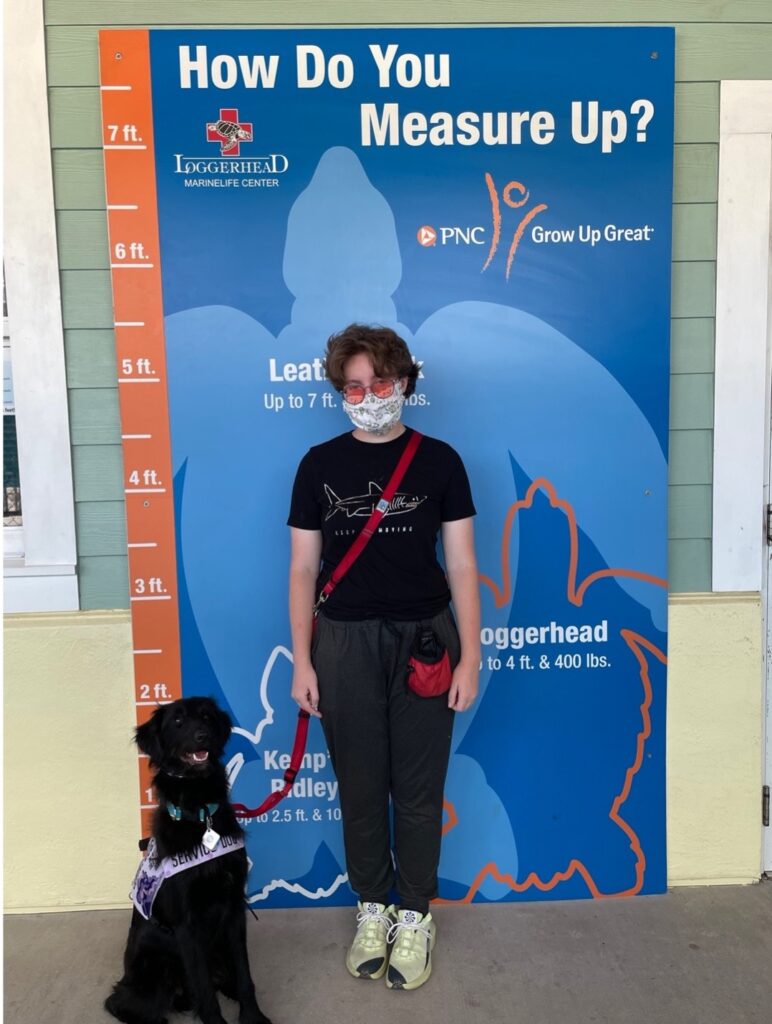
Responsibilities of having a service dog at college
So many things have surprised me about having a service dog at college and so many of them for the better. First of all having a dog at school is like being a single parent, there is only me and him. I must do all the care and cleaning and feeding, as there is no one else to help. You may have roommates, but it is never their responsibility to care for your dog, and although on occasion they may take the dog for a walk, it is your dog foremost. Also on the topic of roommates, it is important to reach out ahead of time to them, telling them about your dog and how they should and should not interact with them.
Getting the accommodations for having a service dog at college
Your school may even have a contract for you to write and sign about responsibilities and consequences, as mine did. Another thing to do before you get to school with the dog is to complete all paperwork the school requires. There most likely will be a form declaring the dog as a service dog, or dog in training, and what tasks it performs. You will have to go through the office of disabilities to get the accommodation. There will likely be a separate form for the housing accommodation for the dog to live with you (most schools also allow ESAs), so make sure to make the dog’s purpose clear. One more thing to do before you arrive is have a vet visit and make sure your dog is up to date on all vaccines, and even opt for things like Lyme and kennel cough because the likelihood of other dogs and diseases other wild animals carry on campus.
Training a service dog at college
I really think a college campus is a great place for training a service dog because of the diversity of people, activities, and buildings. You can do the whole public access test on campus, too! For a young puppy, though, it might be too much. I would not recommend a dog under 6 to 9 months live on campus. This is for various reasons: a dog must be potty-trained to live in a dorm and must be expected to be several hours without the owner for things such as a too-long class or lab or an activity that is unsafe for the dog, in my case snorkeling. If your dog can’t settle for an hour, you can’t bring them to your hour-long class or they will be disruptive.
Now on to the positive: having a service dog at college has been life changing to me and has brought me so much freedom, but with that comes training, and usually we train every day. In college you have fewer classes than in high school and often hours in-between them. There is always time to spend a few minutes practicing. Without Ronan, I would not have made it through the pandemic and back to school this year.

Challenges of having a service dog at college
Challenges I face are not all that complex. They mostly stem from people not knowing how to interact with a service dog. People stare like crazy. It made me very uncomfortable for months, but then you get used to it. You know people are watching so you know your dog has to behave so that makes you train for the best behavior. There will be people who ask to pet your dog and there will be hundreds of people who make faces and side comments about your dog or you. Keep your head held high and you will make it through.
Friends
Most of my friends that I have here at college I made after getting my service dog so they knew we came as a pair but for friends and family back home it was an awkward conversation when I told them what my dog’s purpose was and why he had to come everywhere with me. When telling people it is best to keep it short and simple and if you respect them enough to tell them more details, be patient with their questions.
Professors
So far all of my professors have been quite respectful and accommodating of my service dog at college, mainly because I tell them before I show up to class that I have this dog with me and that he is required but also because most of my classes are within a classroom and the dog does not change any aspects of the course.
Another service dog team at college
What I have found to be immensely rewarding and a great opportunity was that I found a another service dog team on campus and we have become fast friends and our dogs have become like brothers. Together we can both talk about disabilities and our conditions and training our dogs and our hopes for them. if you don’t find another service dog at college, maybe you’ll befriend a person with an ESA.
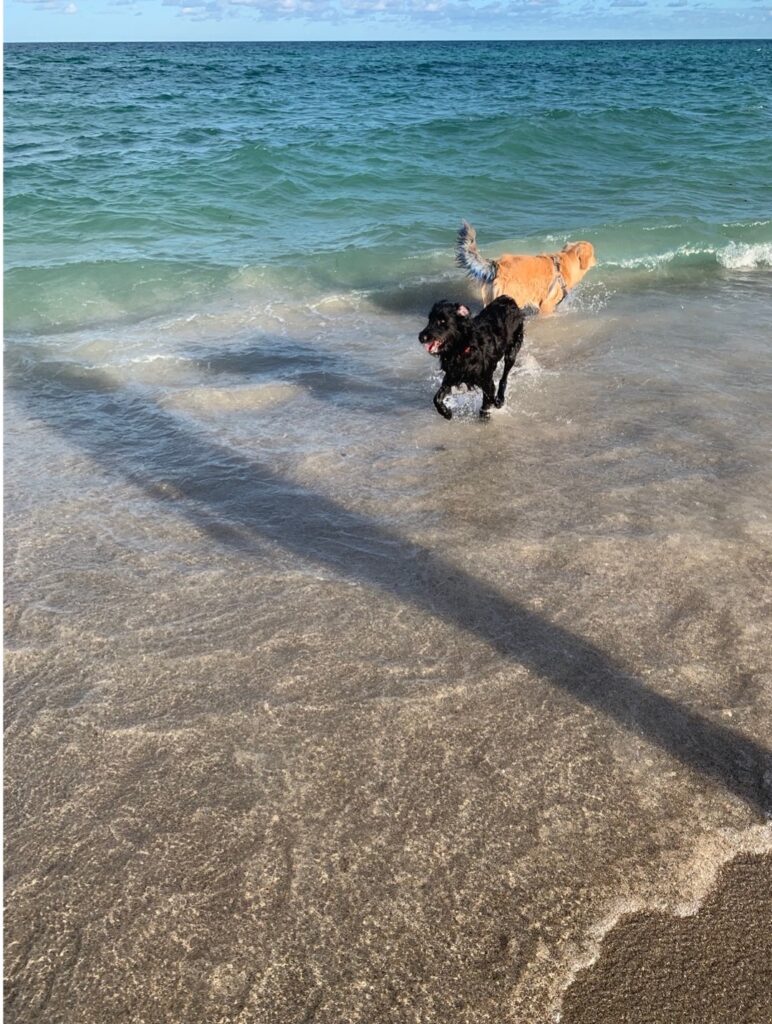
Service dog at college during the pandemic
When I came to school my dog was already six months old and had done a little bit of non-pet-friendly public access and he had already been taught two tasks. For the first semester that I had my dog on campus all of my classes were online so I took them from my dorm room which was very different and weird for me as I don’t do very well in online classes but it gave me great opportunity to train my dog without being watched or the dog having strict expectations. I know this is unlikely to happen now that COVID is becoming more manageable.
The most important skill for a service dog at college: settling
The most important thing a service dog at college needs to be able to do on campus is settle. This means settling for class, settling for waiting in line, and settling at the end of the day after you have come home from classes. That is one hard thing to train but something that comes with the age of a dog.
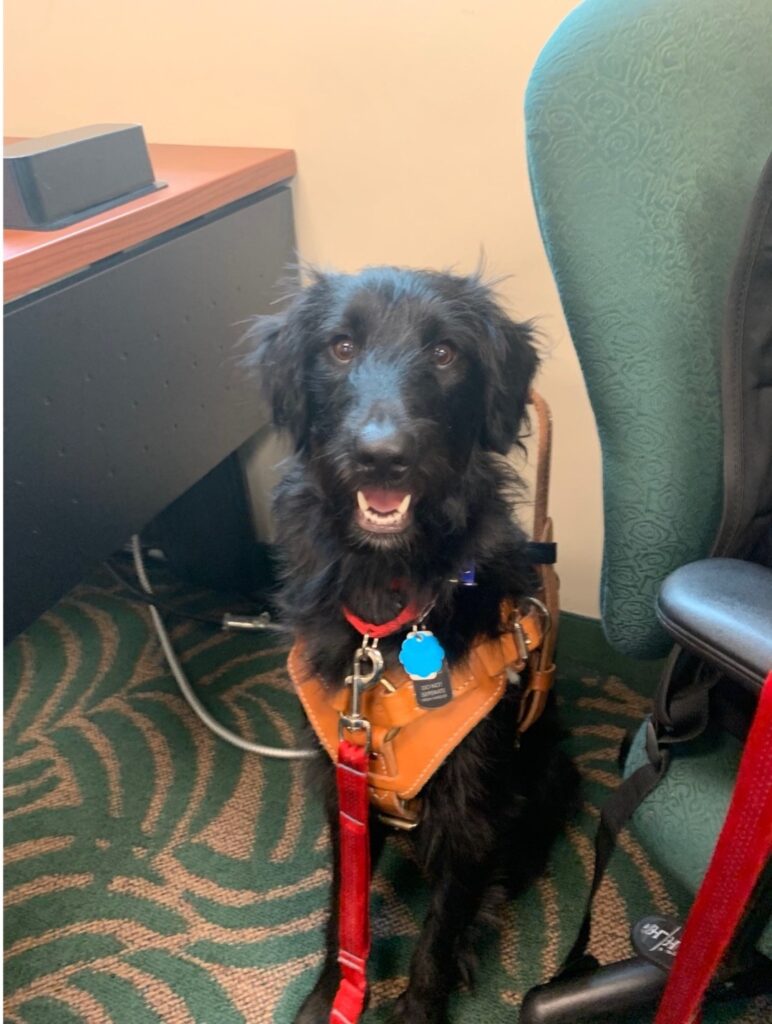
Specialized equipment for a service dog at college
I study environmental science so I have multiple labs that go out into the field or in a chemistry lab setting. Those were two things I had to prepare for that most people won’t have to. For my ecology class that I am taking, we have field excursions where we go out and hike through natural areas. I do take my dog along with me for those, but I keep him in a strict heel and do not let him go after any wildlife at all. For my laboratories, I had to purchase proper personal protection equipment such as dog goggles, boots ,and a white lab coat. I had to contact the head of labs at my school about this so that I could gain permission to bring him and to know what the school required him to do and where.
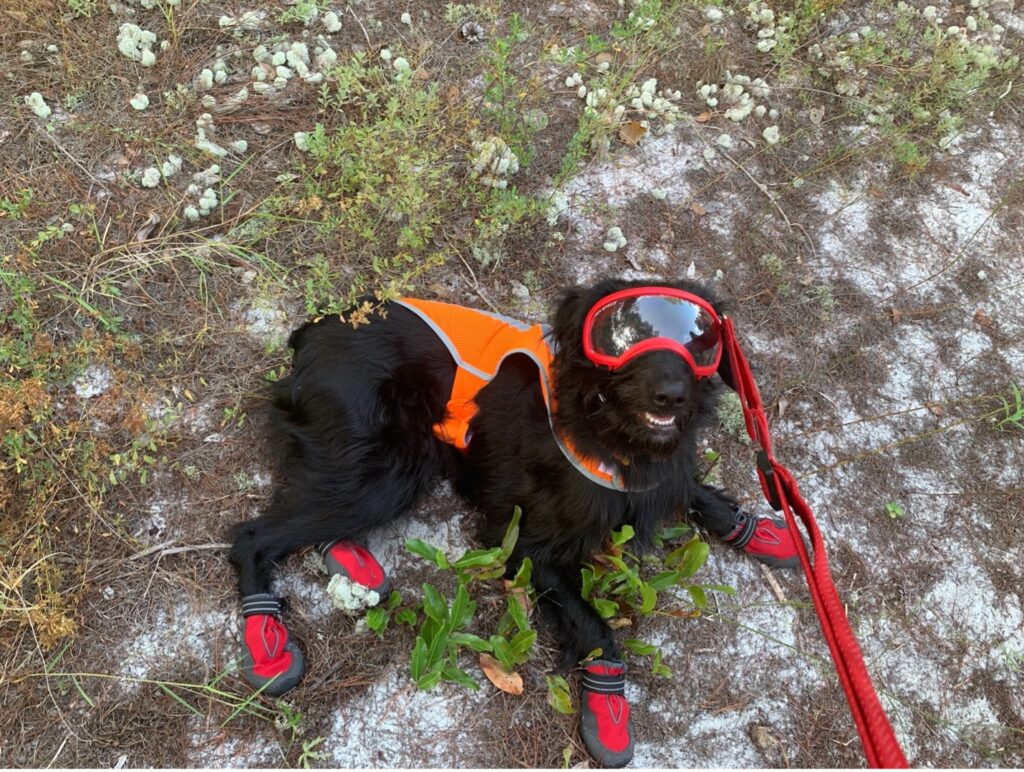
A busy schedule for a service dog at college
On Thursdays my dog accompanies me to everything except for soccer practice because he goes to bed earlier than I do. This is what my Thursdays look like:
6:00 AM I wake up and take my dog out to go to the bathroom. I eat breakfast and take my morning medicine and get dressed for the day.
7:00 AM My friend picks me up for our field lab where she drives us up to an hour to get to. I do not have a car for medical reasons but if you are able to drive, having your own personal car to go out and do things with, especially dog training, is quite valuable.

8:00 AM We start our field lab hike for up to two hours.
10:00 AM I get back into my friends car and drive to the oceanographic campus.
11 AM I have a one and a half hour class on Florida ecology.
12:30 PM I ride the school shuttle for half an hour to get back onto the main campus.
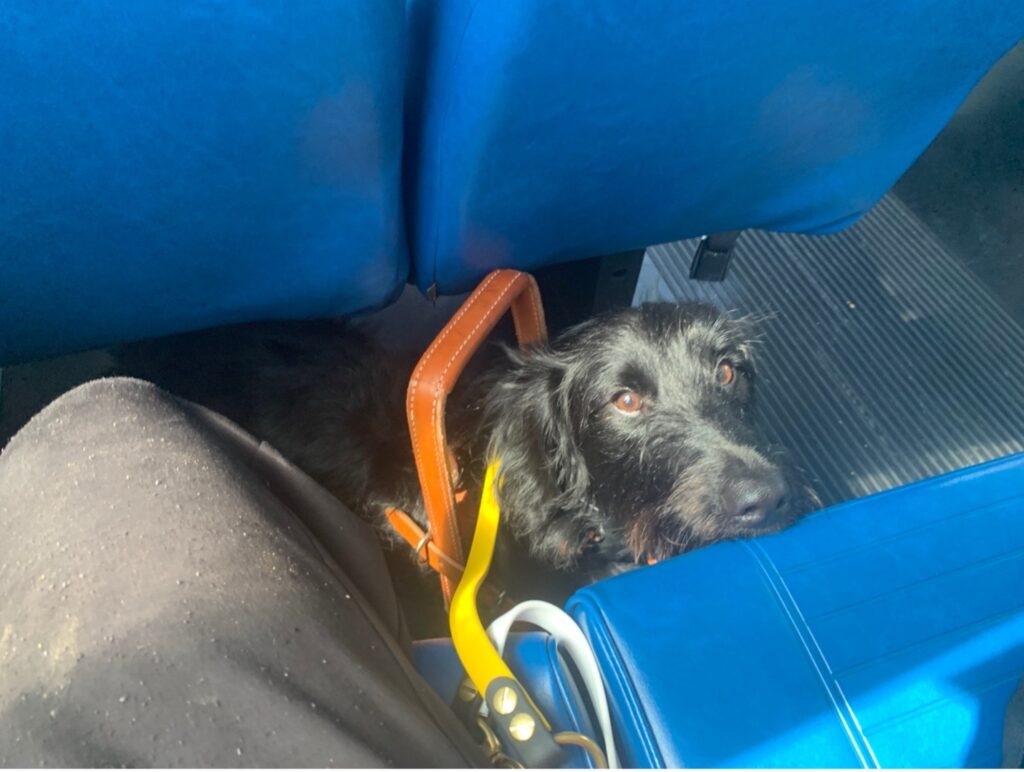
1:00 PM I try and catch some lunch or pick up a sandwich and take my dog to go to the bathroom.
1:30 PM I have folklore class for another hour and a half.
3:00 – 4:30 I go back to dorm and take a small break and eat lunch if I had not gotten to it yet and prepare for geology class.
4:30 – 6:00 PM I have geology class with a strict professor where the dog cannot make any noise.
6:00 – 8:00 PM I catch some dinner and do some homework and train my dog.
8:00 PM – 10:00 PM I have soccer practice.
10:00 PM I take evening meds, get a shower, and go to bed for the night.
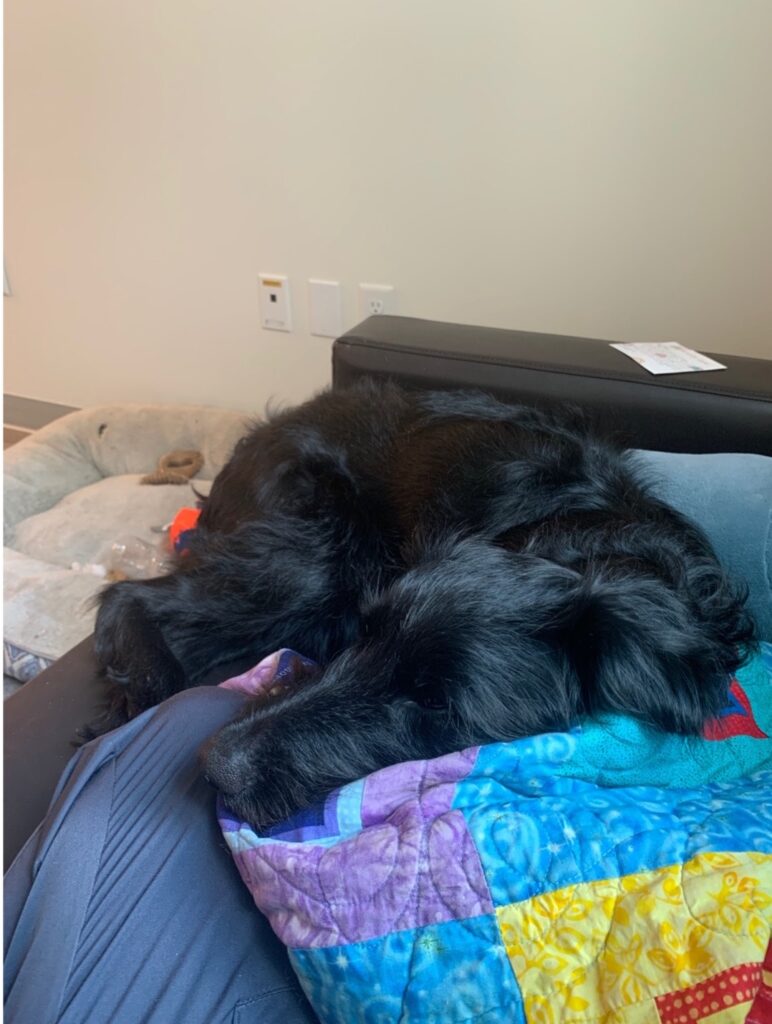
Hard work and lots of fun
Having a service dog at college is not all hard work, though. Ronan and I get to have a lot of fun, too. There is a nearby dog beach and we have taken to reading in a hammock together under the palm trees.

Guest Author: Sofia Porter Bacon is a college student studying environmental science at Nova Southeastern University in Florida but she calls Pennsylvania home, too. She hopes to continue her studies and attend law school to study environmental law. She loves to read and although it may sound cheesy her new favorite hobby is training her dog. Sofia has earned her professional dog training certifications for Foundational Obedience and Public Access (CDT-FO and CDT-PA) through ELLAS Animals INC and is currently working through our Tasks & Work course with Ronan.
Nothing in ELLAS Animals INC’s website or blog is intended as medical, legal, or financial advice. We receive no compensation for recommendations or reviews.

I plan to go to medical school. I hear it’s going to be extremely time consuming but I’m worried how I’ll manage with a service dog.
Good for you! I recommend making sure you have fully trained your service dog before you begin medical school. It would be tough to find the time to train and keep on top of your school work. However, with a fully trained service dog, most schools will work with you to develop a plan to keep both you and your service dog safe during classes, labs, and perhaps even while working with patients in a hospital.
If I take my dog with me to all my classes and walking between classes, how often would I have to walk my PTSD service dog in a day?
We recommend 30 minutes of formal training every day, in at least 2 or more sessions, e.g. two fifteen minute sessions or three 10 minute sessions. A formal training session means you’re not doing anything else and you’ve got a strategic plan for your repetitions and generalization that is based on your training progress. In addition, you’ll want 30-60 minutes of exercise each day. This may not be all at one time because many dogs do much better with short burts of exercise. Remember, walking may be exercise for you, but it isn’t likely exercise for your dog. You’re looking for activities that raise their heart beat and engage their minds, like chasing a ball or playing other games with you. This is good for their health, but also good for their behavior as understimulated dogs may engage in boredom-busting behaviors that aren’t acceptable to us.